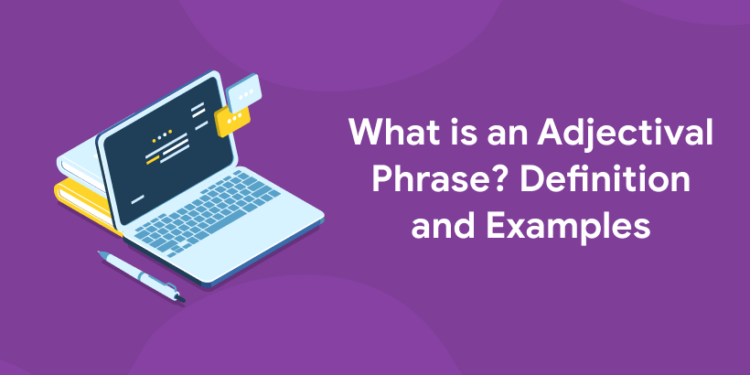Table of Contents
Although most people understand what an adjective is, it’s possible to become confused when defining an adjective phrase. An adjective phrase, also known as an adjectival phrase, is more than a collection of words containing an adjective. It’s a set of words that behave as adjectives to describe a noun or pronoun in a sentence. You don’t need to be a grammar expert to grasp what an adjective phrase is and how it works. These expressions are frequently used.
Enroll for Spoken English Class! Download Entri App!
What is an Adjective?
Adjectives are words that define a noun’s attributes or states of being. Adjectives are words that modify nouns. Verbs, adverbs, and other adjectives are not modified by adjectives. They mostly come immediately before the noun they modify.
Examples: tiny, red, slow, tall etc
Adjectives, on the other hand, can do more than merely modify nouns. They can also be used to support connecting verbs or the verb to be. A connecting verb is a verb that describes a state of being or a sensory experience, such as feel, seem or taste. A predicate adjective is a technical term for an adjective used in this manner.
Example. It smells bad in the attic.
Register for the best English grammar and spoken English coaching
What is a Phrase?
1: Which of the sentences below is grammatically correct?
A phrase is a group of one or more words that create a grammatical unit within a clause. In English, there are five primary kinds of phrases, as shown below.
- Noun phrase
- Verb phrase
- Adjective phrase
- Adverb phrase
- Prepositional phrase
Sign up to learn English Grammar! Download Entri App!
Spoken English Course for Guaranteed Confidence and Career Growth
Spoken English Course by Entri App: Enhance your communication skills, gain certification, and boost your career with confidence.
Join Now!What is an Adjectival Phrase?
Adjective phrases are just one of the various types of phrases you use daily in your speech and writing. Adjectives are used to describe nouns. Adjective phrases are used to describe adjectives. Finally, adjective phrases enrich sentences by providing more vivid descriptions for nouns.
Definition of an Adjectival Phrase
An adjective phrase is a collection of words that serve as an adjective when used together. That is, in a sentence, the phrase itself functions as an adjective. At least one adjective is included in an adjective phrase, as well as at least one other word. The overall adjective phrase includes any terms that are modifiers or complements to the adjective. An adjective phrase can be placed either before or after the noun it is describing.
The function of an Adjectival Phrase
Adjective phrases can be used to modify nouns or pronouns, and they work in the same way for both.
Enroll for Spoken English Class! Download Entri App!
Spoken English Course for Guaranteed Confidence and Career Growth
Spoken English Course by Entri App: Enhance your communication skills, gain certification, and boost your career with confidence.
Join Now!How to identify an Adjectival phrase
- In the sentence, look for an adjective, which is a word that complements a noun or pronoun.
- Determine whether the adjective is used alone or in combination with one or more additional words to describe a noun or pronoun.
- It’s only an adjective if it’s working by itself. It is the head of an adjective phrase if it is used with other words.
- Identify the other words that are used to describe the noun or pronoun in association with the head adjective.
- The adjective phrase includes these. Adverbs, prepositions, prepositional phrases, and other adjectives can all be used as modifiers.
Examples of an Adjectival phrase
- Some, like these instances, use comparative and superlative adjectives.
- We saw the year’s most devastating tornado.
- They saw only the brightest sides slide through their microscope.
- Adjective phrases frequently contain compound adjectives.
- The play, short and misrepresented, faced censure from historians.
- The playlist was very fast-paced for the crowd that night.
- Adverbs can be found in adjective phrases:
- It was a lusciously dramatic play.
- His hair, outrageously dyed pink, astounded his parents.
- They can also include prepositions.
- The children, like popcorn, were jumping all over their trampoline.
- My grandma from New York prepares a delightful ice cream.
- An adjective phrase is sometimes nothing more than a collection of adjectives.
- My ancient, sluggish, gas-guzzling car finally died.
- They took a deep, onerous physics course.
- They’re frequently used in front of or after the noun or pronoun they’re describing.
- The very little cat leapt at the giant dog.
- She selected paint for her apartment that is a lemony yellow
Enroll for Aparna Mulberry Spoken English Class!
Whatever an adjective phrase contains or where it appears in a sentence, it always adds to the descriptiveness of the statement without changing its basic meaning. A well-chosen adjective phrase can add life and personality to a sentence. A single adjective may suffice, but if it can be expanded into an adjective phrase, you may be able to convey more information to your readers. Download the Entri app to help you improve your knowledge in various areas of English grammar.










